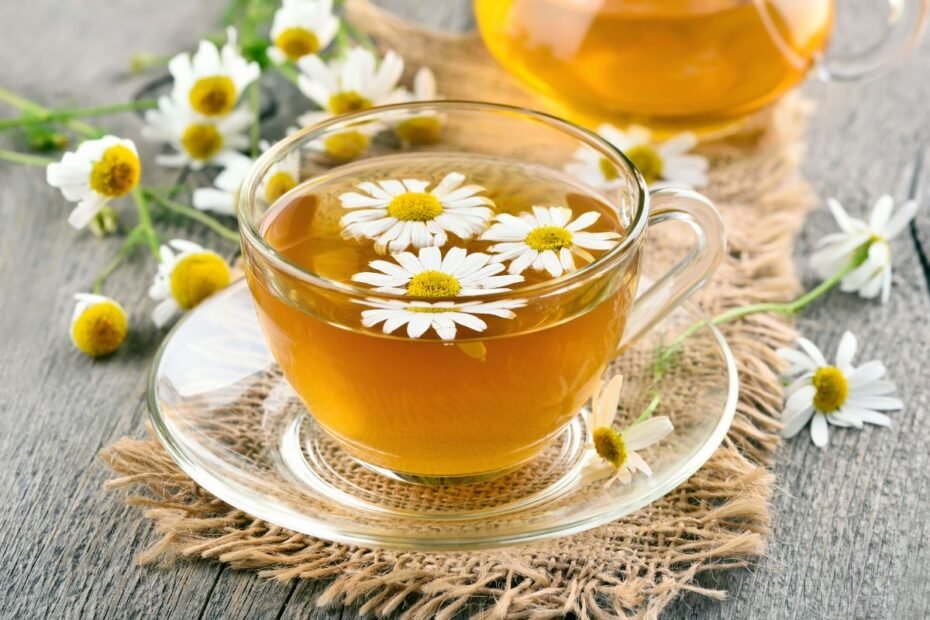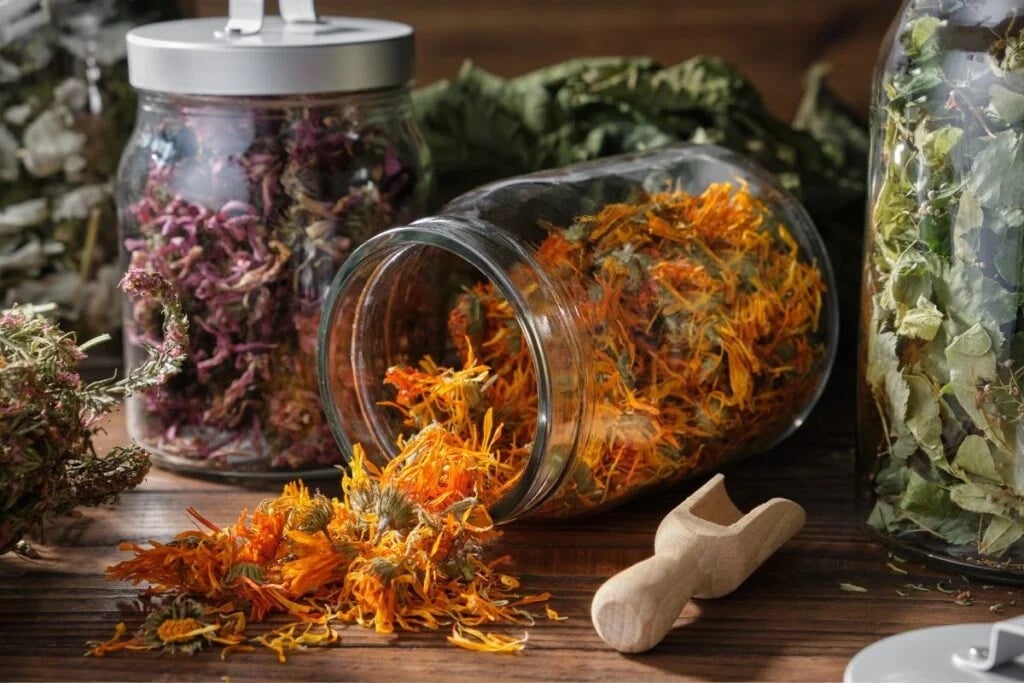Chamomile tea is a well-balanced drink with many beneficial properties. This tea is rich in antioxidants that can promote your health and reduce the risk of some serious diseases. It is also a beverage that helps improve sleep and digestion, as well as being beneficial for your beauty.
Some people like chamomile tea as a decaffeinated alternative to black or green tea. The mild, slightly sweet taste of chamomile tea fascinates many people. Of course, it is worth remembering that chamomile is an herb and should not be overused.
Briefly About Chamomile
Chamomile (Matricaria recutita) is the plant used to make what is commonly known as chamomile tea. Chamomile is an annual herbaceous plant, usually branched, with feathery leaves and white flowers. It grows in fields, by roadsides, and near houses. Flowers bloom in May–September and only chamomile flowers without stems are picked horizontally and used for medicines and teas. Chamomile needs drying in a well-ventilated room out of direct sunlight and spreading in a thin layer. It is also important not to over-dry the chamomile flowers, which must remain greenish-yellow, fragrant, and bitter-tasting.
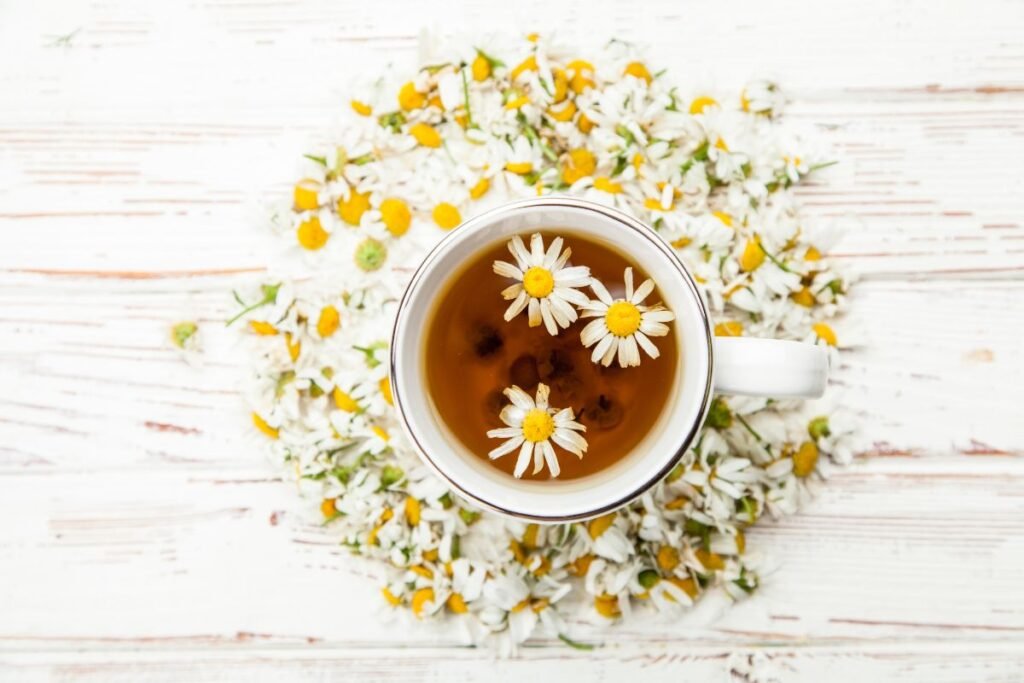
Benefits of Chamomile Tea
Chamomile flowers are rich in medicinal, anti-inflammatory, antimicrobial, and regenerative properties due to the vitamins, essential oils, cartilage, coumarins, choline, salicylic acid, mucilage, and other substances. These flowers have a strong therapeutic effect, not because of their constituents, but because all these substances act synergistically, enhancing each other’s action. Chamomile is used medicinally for the treatment and recovery of various internal and external ailments:
- Chamomile tea is helpful for cold inhalations and as a rinse for sore throats and mouth infections.
- For digestive and duodenal ailments like flatulence and diarrhea, relieve intestinal spasms and gas accumulation in the intestines. Suitable for stomach disorders: ulcers, reflux, gastritis.
- Chamomile is popularly known as a natural aspirin because of its ability to relieve joint pain, rheumatism, or other pain caused by injuries and inflammation. It helps with backaches and fevers.
- It is suitable for treating malignant tumors (it contains flavonoid apigenin – an anticancer agent), inflammation of the kidneys, and other inflammations in the body.
- For tooth or gum pain, remove the soaked chamomile flowers from the brewed tea, knead them, and apply them directly under the lip on the gum.
- Suitable for treating external skin lesions, strengthening the hair, and for dandruff.
- It stimulates sweating, is suitable for liver diseases, and is a bile-diverting agent.
- Use chamomile decoction to soak hands and feet in situations of heavy sweating.
- It is suitable for use before bedtime, as it calms and improves sleep quality.
Researchers have carried out several studies to prove the benefits of chamomile tea. According to them, chamomile can:
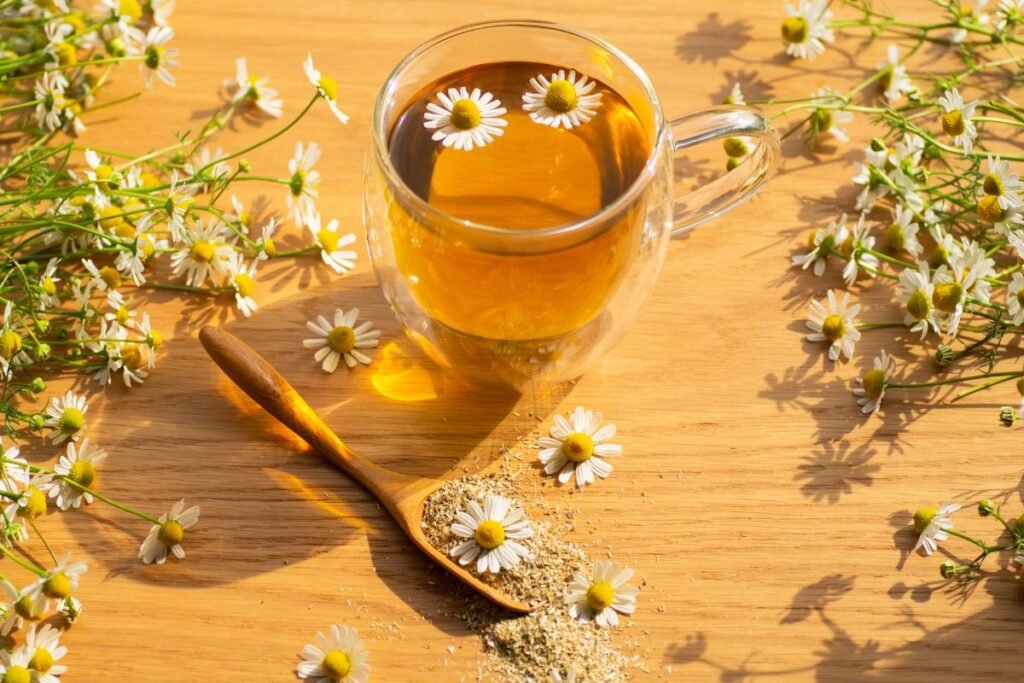
Chamomile Tea Can Improve Sleep Quality
Chamomile contains apigenin, an antioxidant that acts on certain receptors in the brain that promote sleepiness and reduce insomnia.
In one study, postnatal women who drank chamomile tea for two weeks reported better sleep quality than women who did not. They also reported significantly fewer symptoms of depression.
Another study found that people who drank 270 ml of chamomile tea two times a day for 28 days were 1/3 less likely to wake up at night and fall asleep 15 minutes sooner than those who didn’t.
Tea May Help Regulate Blood Sugar Levels
Studies show that chamomile tea can help lower blood sugar levels. Chamomile’s anti-inflammatory properties can prevent damage to pancreatic cells, which occurs when blood sugar levels are persistently high.
A study involving 64 people with diabetes found that those who drank chamomile tea with daily meals for eight weeks had significantly lower average blood sugar levels than those who consumed water.
Chamomile Tea Can Improve Digestive Function
There is no doubt that proper digestion is essential for your overall health. Studies have shown that chamomile can effectively improve digestion and prevent certain digestive disorders. In several animal studies, chamomile tea helps with diarrhea, reduces stomach acidity, and helps prevent stomach ulcers. There are also many unconfirmed claims that chamomile tea has a soothing effect on the stomach and is used to reduce nausea, gas, and even constipation.
Chamomile Tea May Protect Against Certain Types of Cancer
Chamomile contains the antioxidant apigenin. In vitro studies have shown that apigenin fights cancer cells, particularly breast, gastrointestinal, skin, prostate, and uterine cancers. In addition, one study involving 537 people found that those who drank chamomile tea 2–6 times a week had significantly fewer cases of thyroid cancer than those who did not.
Chamomile Blossom Tea Can Improve Heart Function
Chamomile tea is rich in the antioxidant class of flavones. These substances have been studied due to their potential to lower blood pressure and cholesterol levels, both important indicators of heart disease risk.
Researchers involved 64 diabetic patients in one study. It found that those who drank chamomile blossom tea with meals had significantly lower levels of total cholesterol, triglycerides, and “bad” LDL cholesterol than those who took water.

Chamomile Tea for Babies
If your baby is restless, possibly experiencing tummy aches, flatulence, or teething, then you can try chamomile tea. Take a teaspoon of chamomile in 100 ml of boiling water and strain after 5 minutes.
Dilute ten drops of the tea in 10 ml of water and give it 2-3 times daily to a baby aged 0–2 months.
You can give undiluted chamomile tea (10–50 ml) 2-3 times a day to babies aged 2–6 months, depending on the child’s age.
This tea is recommended as a mild remedy not only by folk medicine but also by doctors.
Chamomile Tea is Both for Women and Men
Although not recommended for pregnant women, chamomile tea is ideal for relaxing the abdominal muscles after childbirth. It is also excellent for relieving menstrual pain.
As chamomile contains the antioxidant apigenin, it works wonders in stopping the growth of various tumors, including breast, ovarian, and, for men, prostate cancer.
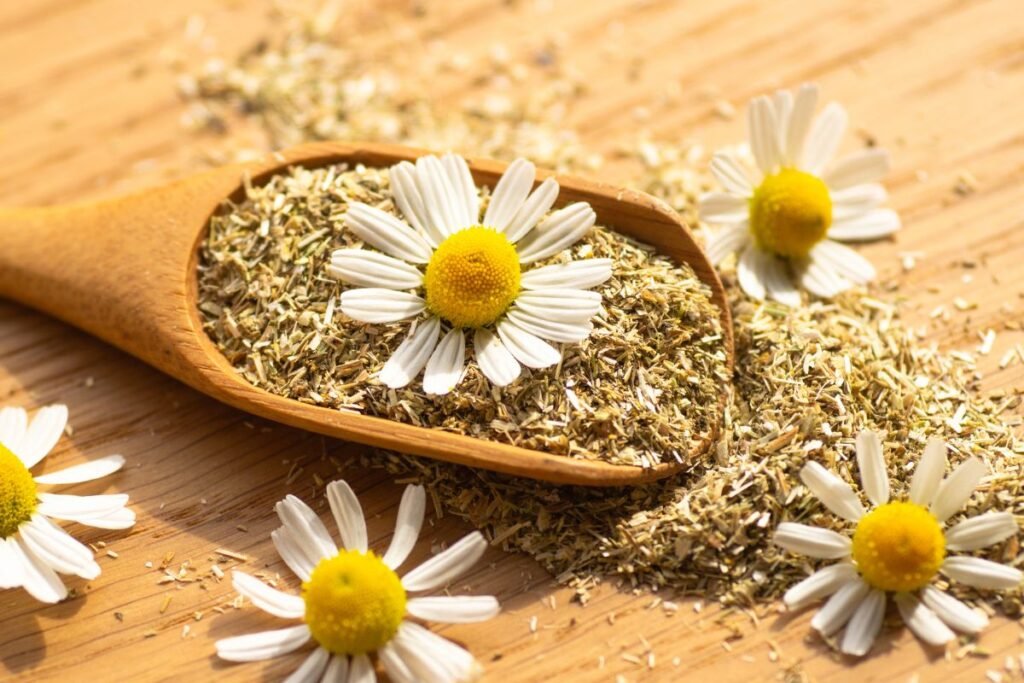
How to Prepare Chamomile Tea
This tea improves appetite and the digestive tract. Add one teaspoon of dried chamomile flowers to a standard-sized cup (250 ml) and cover with boiling water. Leave to infuse and cool for about 15 minutes. You can flavor the tea with honey and/or lemon.
Prepare a stronger chamomile tea by brewing one tablespoon of chamomile flowers in a cup for acute inflammation or digestive disorders. Drink it cooled 2-3 times a day.
Chamomile Infusion for Hair and Rinsing
Women who want to strengthen their hair roots to make them soft and shiny should rinse them with a chamomile decoction. This extract will give your hair a slight yellowing effect and remove dandruff.
Add two tablespoons of chamomile flowers to a cup (250 ml) and cover with boiling water to make a chamomile infusion for hair. Allow to soak for at least 15 minutes, then use the decoction once it has cooled. This decoction is also suitable for rinsing the mouth and throat due to sore throats or mucous membrane lesions.
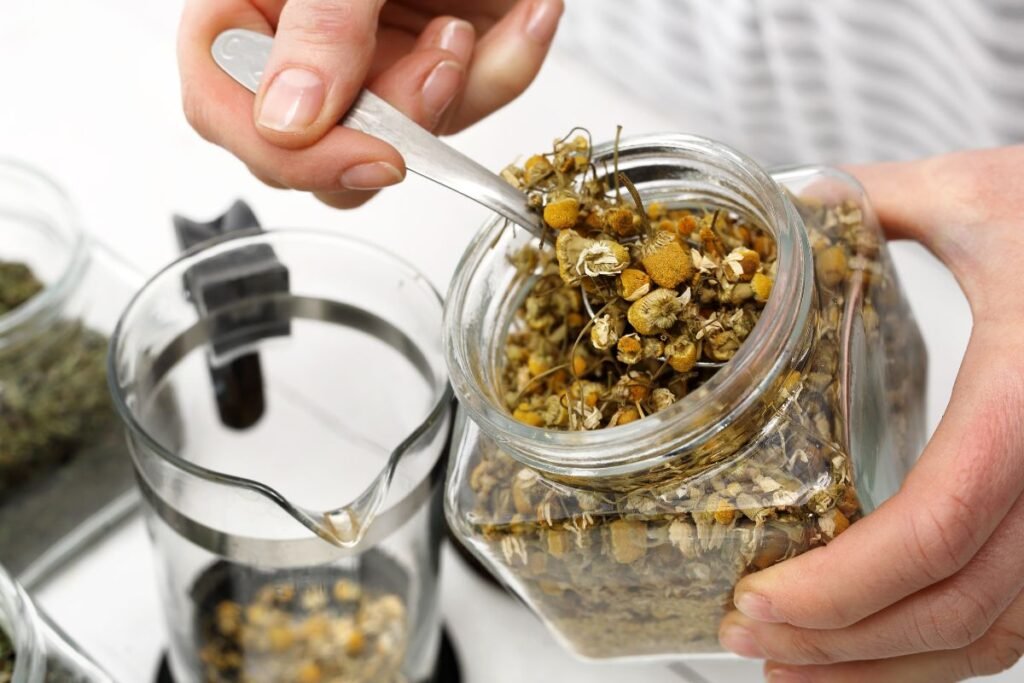
Chamomile Compresses: for Pain Relief, Facial Skin, and Eyes
Many people use chamomile poultices to reduce inflammation and disinfect wounds. Flavonoids from chamomile tea penetrate the skin’s surface into the deeper layers, preserving youthful skin. Chamomile compresses prevent skin aging, heal the skin, and reduce irritation. It is suitable for eye irritations, inflammation, and tearing.
Add one liter of water to a saucepan and five tablespoons of dried chamomile. Once boiling, you can continue the process for up to 15 minutes. After removing it from the stove, simmer for 15 minutes until it becomes more absorbent and clearer, then strain it off. Wet the gauze with this decoction, wring it out, and apply it to the sore area of the face skin. If you have patience, leave it on for 15–20 minutes or longer.
For eye compresses, you can make a smaller amount of decoction. Wet cotton discs or pieces of cotton wool and apply them to the eyes for at least 15–20 minutes. This treatment can also be a moment of calm and relaxation to relieve stress and tension, particularly if you lie down and listen to soothing or other favorite music. If you are more tired, you can also take a nap.

Side Effects of Chamomile Tea
Some people should avoid chamomile tea, and these are:
- who are allergic to other herbs or have hay fever (or at least use it with caution),
- taking blood thinners,
- taking other medicines: chamomile tea should not be drunk more than 2 hours before or at least 2 hours after taking medicines, as chamomile tea interferes with the absorption of some medications,
- pregnant women: during pregnancy, chamomile stimulates uterine contractions and can cause premature birth,
- tired people and drivers, as chamomile tea can induce drowsiness.
People with some stomach disorders, such as ulcers or inflammation, should drink chamomile tea several times a day for one month, but never in excess. Drink the tea for therapeutic purposes, but not as a prophylactic; frequent use of chamomile tea reduces its effectiveness and may cause side effects.
Source:
https://www.healthline.com/nutrition/5-benefits-of-chamomile-tea
Research:
https://pubmed.ncbi.nlm.nih.gov/26483209/
https://www.ncbi.nlm.nih.gov/pmc/articles/PMC3198755/
https://pubmed.ncbi.nlm.nih.gov/25194428/
https://academic.oup.com/eurpub/article/25/6/1001/2467362
Associative photos from © Canva.
